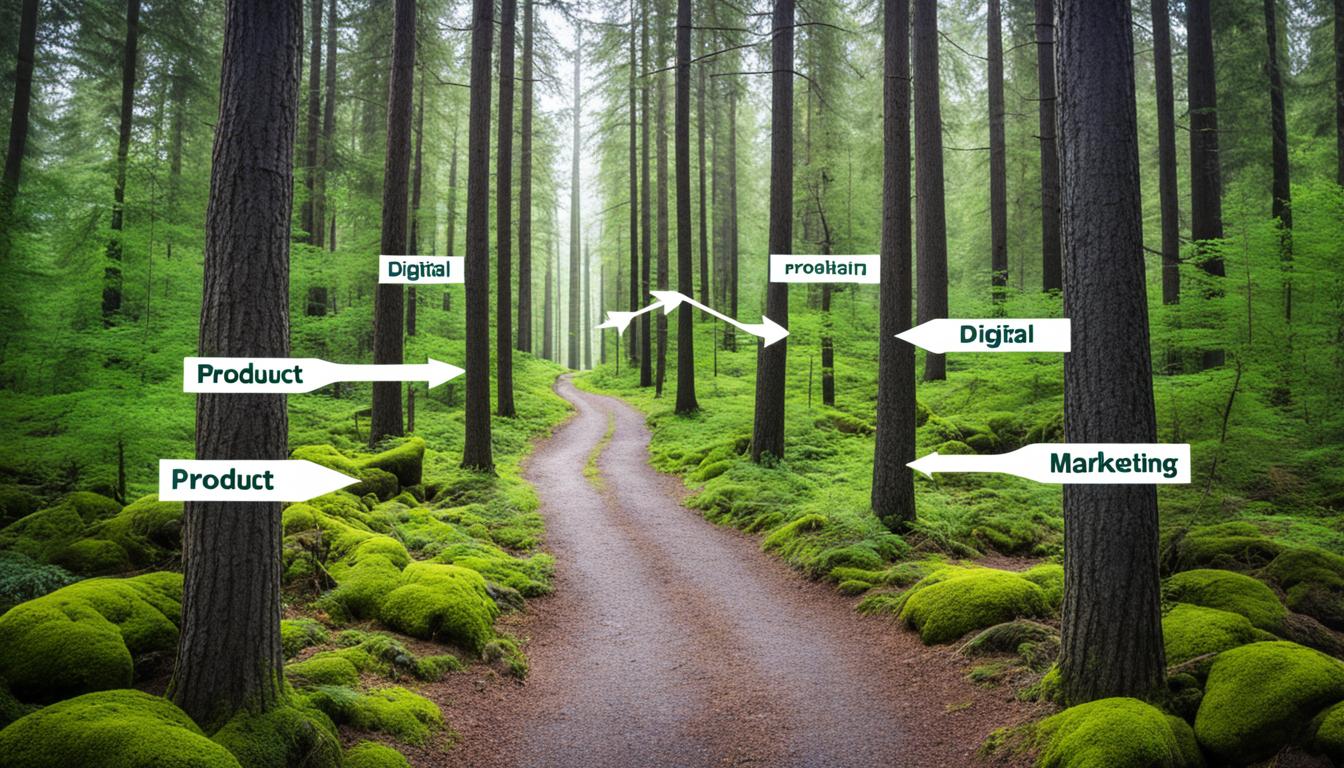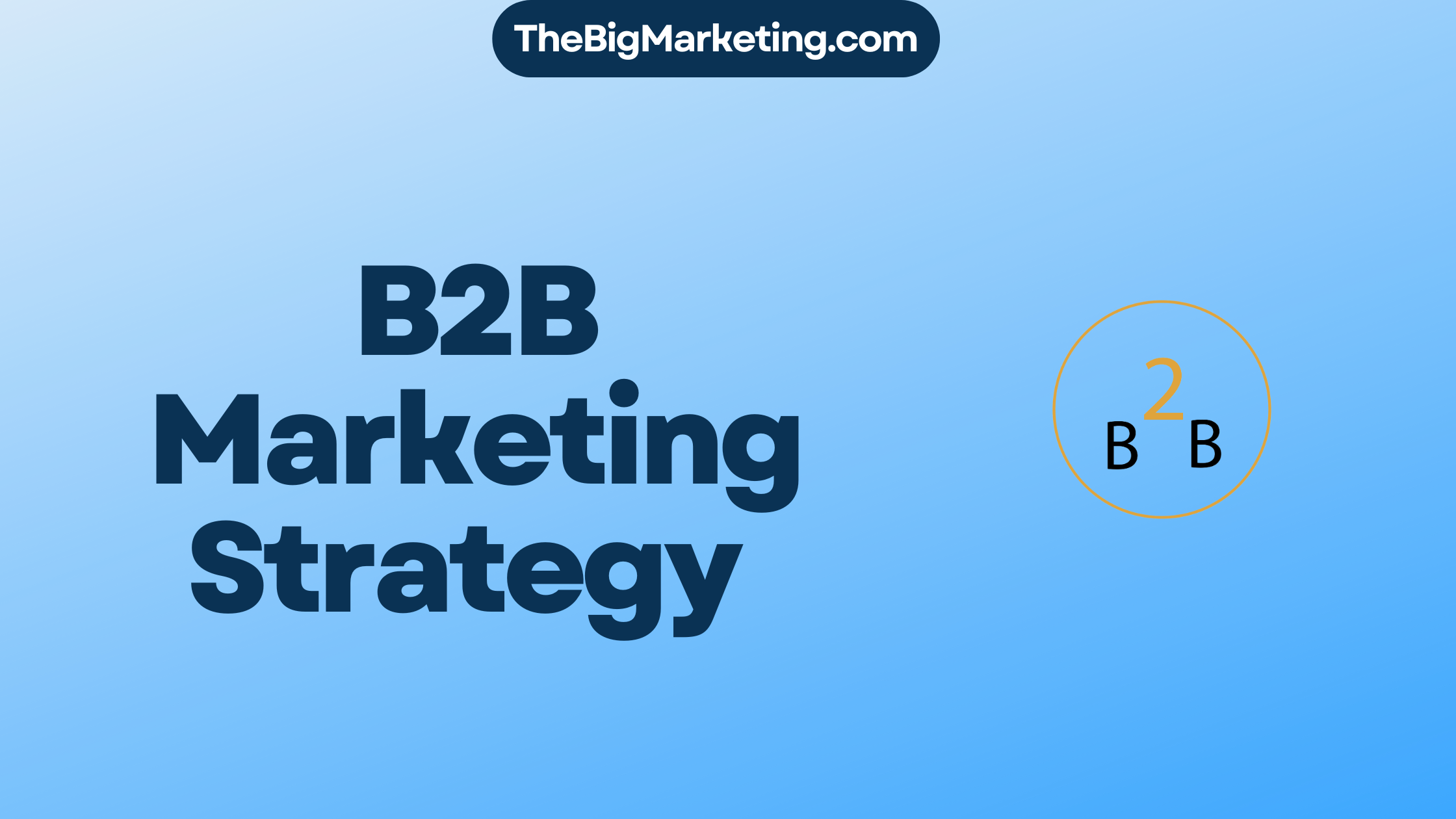The rise of big data has had a profound impact on the world of B2B marketing. With the ability to collect and analyze vast amounts of information, businesses now have the power to make data-driven decisions and optimize their marketing strategies like never before. In this article, we will explore the role of big data in B2B marketing, from leveraging data analytics to understanding the buyer’s journey and identifying target markets. Join us as we delve into the world of big data and discover the strategies that can drive success in B2B marketing.
Key Takeaways:
- Big data enables B2B marketers to create personalized and targeted campaigns.
- Data analytics provides insights and actionable information for optimizing marketing efforts.
- Understanding the buyer’s journey is crucial for tailoring content and messaging.
- Identifying target markets through market research helps address specific needs and preferences.
- Incorporating data into B2B marketing strategies enhances customer experiences and drives growth.
The Influence of Data Analytics in B2B Marketing
Data analytics plays a crucial role in B2B marketing, enabling businesses to make informed decisions and drive successful marketing campaigns. By utilizing big data in B2B marketing, companies can gain valuable insights and actionable information that can significantly impact their strategies.
Segmentation and Personalization
Data analytics allows B2B marketers to segment their audience based on various criteria such as industry, company size, or purchase behavior. This segmentation enables marketers to deliver highly targeted and personalized marketing messages to different customer segments, increasing the relevancy and effectiveness of their campaigns.
Lead Scoring and Prioritization
By analyzing data, B2B marketers can develop lead scoring models to identify and prioritize leads based on their likelihood to convert. This enables marketers to focus their efforts on high-value leads, improving lead conversion rates and maximizing ROI.
Customer Behavior Analysis
Data analytics provides insights into customer behavior throughout the buyer’s journey. B2B marketers can analyze customer interactions, website engagement, and content consumption patterns to understand their preferences, needs, and pain points. This understanding allows marketers to tailor their marketing efforts and deliver relevant content at each stage of the customer’s journey.
Campaign Performance Tracking
Data analytics allows B2B marketers to track the performance of their marketing campaigns in real-time. By analyzing key metrics such as click-through rates, conversion rates, and engagement levels, marketers can assess the effectiveness of their campaigns and make data-driven optimizations to improve results.
Predictive Analytics and Future Trends
Utilizing big data in B2B marketing empowers marketers to leverage predictive analytics to forecast future trends and outcomes. By analyzing historical data and identifying patterns, marketers can make informed predictions about customer behavior, market trends, and industry shifts. This ability allows B2B marketers to stay ahead of the competition and proactively adjust their strategies.
Customer Lifetime Value Analysis
Data analytics enables B2B marketers to assess the lifetime value of their customers. By analyzing customer behavior, purchase history, and retention rates, marketers can identify their most valuable customers and develop strategies to maximize customer lifetime value, loyalty, and advocacy.
Market Research and A/B Testing
Data analytics facilitates market research by providing valuable insights into your target market and industry trends. B2B marketers can conduct A/B testing to compare different marketing approaches or messages, identify the most effective strategies, and optimize their campaigns based on data-driven insights.
Social Listening
With the help of data analytics, B2B marketers can monitor social media platforms and online conversations to gain valuable insights and understand customer sentiment. Social listening allows marketers to identify trends, respond to customer feedback, and adapt their marketing strategies accordingly.
By leveraging the power of data analytics, B2B marketers can optimize their marketing efforts, improve targeting, enhance customer engagement, and drive better results. Incorporating data-driven strategies into B2B marketing enables businesses to stay competitive in today’s digital landscape.
Leveraging the Buyer’s Journey in B2B Marketing
Understanding and mapping the buyer’s journey is essential for effective B2B marketing strategies. By analyzing data and leveraging big data insights, marketers can tailor their content and messaging to each stage of the buyer’s journey.
At the awareness stage, targeted content can provide valuable information and solutions to potential buyers. By utilizing big data, B2B marketers can identify the pain points and challenges faced by their target audience, and create informative content that addresses these concerns. This personalized approach helps in building trust and establishing credibility.
As potential buyers progress to the consideration stage, personalized recommendations become crucial. By leveraging data analytics, marketers can analyze buyer behavior, preferences, and engagement patterns to offer specific solutions that align with their needs. This targeted messaging helps in nurturing leads and guiding them towards making informed decisions.
When buyers reach the decision stage, personalized offers can significantly increase the likelihood of conversions. By utilizing big data insights, marketers can understand the specific requirements and goals of potential buyers, and tailor their offerings accordingly. This personalized approach creates a compelling value proposition that resonates with potential buyers.
By leveraging the buyer’s journey and utilizing big data, B2B marketers can guide buyers through the decision-making process, improve engagement, and increase the likelihood of conversions. Targeted content and personalized messaging play a crucial role in building relationships, establishing trust, and driving successful B2B marketing campaigns.
Identifying Target Markets in B2B Marketing
Identifying and understanding target markets is crucial for successful B2B marketing strategies. By conducting market research and analyzing industry trends, businesses can define their ideal customer profile and create buyer personas. This enables businesses to tailor their marketing efforts to address the specific needs, preferences, and pain points of their target market.
One effective approach to identifying target markets is by leveraging big data in B2B marketing. By utilizing data-driven strategies, businesses can monitor target market trends, track buyer behavior, and make informed adjustments to their marketing strategies.
Market research plays a vital role in identifying target markets. By gathering and analyzing data from various sources, such as customer surveys, competitor analysis, and industry reports, businesses gain valuable insights into their target market’s characteristics, needs, and behaviors. This information helps businesses refine their marketing strategies and improve their chances of success.
Data-Driven Market Research
Data-driven market research involves collecting and analyzing large volumes of data to gain a deeper understanding of the target market. This includes demographic data, psychographic data, purchasing behaviors, and more. By analyzing this data, businesses can identify patterns, trends, and opportunities that can inform their marketing strategies.
| Data Sources | Benefits |
|---|---|
| Customer Surveys | Gain direct insights from target customers about their needs, preferences, and pain points. |
| Competitor Analysis | Understand the competitive landscape and identify gaps in the market that can be targeted. |
| Industry Reports | Access market trends, industry forecasts, and relevant data to make informed decisions. |
| Website Analytics | Track website traffic, visitor behavior, and conversion rates to optimize online marketing efforts. |
By integrating data from these various sources, businesses can create comprehensive buyer personas that accurately represent their target market. Buyer personas provide a detailed profile of the ideal customer, including demographic information, pain points, motivations, and preferred channels of communication.
Having a clear understanding of the target market allows businesses to develop effective marketing strategies that resonate with their audience. With the insights gained from data analysis, businesses can create personalized messaging, tailored content, and targeted advertising campaigns that speak directly to the needs and interests of their target market.
Overall, the combination of market research and data-driven strategies empowers businesses to identify and connect with their ideal customers, ultimately driving success in B2B marketing.
The Role of CRM in B2B Marketing
Customer Relationship Management (CRM) systems play a vital role in B2B marketing. They enable businesses to manage customer data, track interactions, and optimize marketing strategies. By utilizing CRM data, B2B marketers can personalize messaging, target key accounts, and deliver relevant content across multiple channels.
Effective Lead Generation and Sales Pipeline Management
A well-implemented CRM platform allows B2B marketers to streamline lead generation efforts and efficiently manage the sales pipeline. By capturing and organizing valuable customer information, businesses can identify potential leads, track their progression through the customer journey, and prioritize follow-up activities.
Insights into the Complex B2B Buyer Journey
The B2B buyer journey can be complex, involving multiple decision-makers and a longer sales cycle. CRM systems provide valuable insights into customer interactions, preferences, and behavior throughout the buying process. This data-driven approach enables businesses to better understand their target audience, identify pain points, and tailor their marketing messages accordingly.
Personalized Messaging and Targeted Account-Based Marketing
By leveraging CRM data, B2B marketers can create personalized and targeted messaging that resonates with their audience. Whether it’s through highly customized email campaigns, personalized website content, or tailored social media ads, CRM-enabled marketing ensures relevant and engaging experiences for potential customers.
Delivering Relevant Content Across Multiple Channels
A robust CRM system allows for the seamless delivery of relevant content across various channels, including email, social media, and offline interactions. By understanding customer preferences and interests, B2B marketers can provide valuable and timely information, fostering stronger relationships and increasing the chances of conversions.
| Benefits of CRM in B2B Marketing |
|---|
| 1. Efficient lead generation and management |
| 2. Better understanding of the buyer journey |
| 3. Personalized messaging and targeting |
| 4. Seamless delivery of relevant content |
The Impact of Digital Transformation on B2B Marketing
Digital transformation has revolutionized B2B marketing, allowing businesses to harness the power of big data, AI, machine learning, and digital channels. This transformation has brought significant changes to the way B2B marketers operate and has opened up new opportunities for growth and success.
One of the key advantages of digital transformation in B2B marketing is the ability to implement data-driven strategies. By leveraging big data analytics, B2B marketers can gain valuable insights into customer behavior, preferences, and buying patterns. This data enables them to create highly personalized and targeted campaigns that resonate with their target audience.
A strong digital presence has become essential in B2B marketing. By leveraging digital channels such as websites, social media, email marketing, and paid advertising, businesses can reach their target audience more effectively. These digital platforms offer greater reach and allow for precise targeting, ensuring that marketing messages are delivered to the right audience at the right time.
Content marketing has also become a vital component of digital transformation in B2B marketing. Creating high-quality, relevant, and valuable content helps businesses establish thought leadership, build trust, and engage with their target audience. By providing helpful information and insights, businesses can position themselves as experts in their industry and attract potential customers.
Digital transformation has also paved the way for more advanced marketing strategies. B2B marketers can now track and analyze the performance of their marketing campaigns in real-time, enabling them to make data-informed decisions and optimize their strategies for better results. They can also leverage AI and machine learning algorithms to automate repetitive tasks, personalize marketing messages, and improve customer experiences.
While digital transformation has brought significant changes to B2B marketing, it’s important to note that traditional marketing methods still have their place. It’s crucial for businesses to strike the right balance between digital and traditional approaches to reach their target audience effectively and maximize their marketing efforts.
In conclusion, the impact of digital transformation on B2B marketing cannot be overstated. It has empowered businesses to leverage big data, implement data-driven strategies, enhance their digital presence, and optimize their marketing efforts. By embracing digital transformation, businesses can stay ahead of the competition, engage with their target audience effectively, and achieve long-term success in the ever-evolving digital landscape.
Data-Driven B2B Marketing: A Deeper Dive
Data-driven strategies are paramount in the world of B2B marketing. By harnessing the power of big data, businesses can create highly personalized and targeted campaigns that resonate with their intended audience. This approach allows marketers to gain valuable insights from data analysis, optimize their marketing efforts, and continually refine their strategies based on real-time feedback.
Through data analysis, companies can not only improve their website user experience but also track the performance of their marketing campaigns. By closely monitoring key metrics and identifying trends, B2B marketers can make data-informed decisions that enhance customer engagement and drive conversions.
One of the most significant advantages of data-driven B2B marketing is the ability to personalize customer experiences. By leveraging data insights, marketers can tailor messaging, offers, and content to meet the unique needs and preferences of their target audience. This level of personalization fosters stronger connections, builds trust, and increases the likelihood of conversions.
Benefits of Data-Driven B2B Marketing
- Improved targeting and segmentation
- Enhanced customer engagement and satisfaction
- Increased conversion rates
- Better insights into customer behavior and preferences
- Optimized marketing strategies based on data-driven insights
Data-driven B2B marketing allows businesses to stay ahead of the competition by leveraging the power of data analysis and personalization. By continually refining their strategies based on real-time insights, marketers can create highly effective campaigns that drive business growth and success.
| Data-Driven B2B Marketing | Traditional B2B Marketing |
|---|---|
| Highly personalized campaigns tailored to individual customers | Generic, one-size-fits-all marketing messages |
| Real-time tracking of campaign performance and optimization | Limited visibility into campaign effectiveness |
| Data-driven insights guiding marketing decisions | Reliance on intuition and assumptions |
| Improved customer engagement and satisfaction | Less focused efforts and lower customer satisfaction |
Data-driven strategies revolutionize B2B marketing by enabling businesses to leverage the power of data analysis, personalization, and real-time insights. By embracing this approach, marketers can enhance customer engagement, boost conversion rates, and drive long-term success in the ever-evolving digital landscape.
Incorporating Data into Your B2B Marketing Strategy
In today’s competitive marketing landscape, incorporating data into your B2B marketing strategy is crucial for optimizing your marketing efforts and achieving better results. By leveraging the power of big data and data-driven marketing strategies, businesses can enhance customer experiences, improve efficiency, and drive growth.
When utilizing customer data, it is vital to prioritize data security and privacy. Safeguarding sensitive information builds trust with customers and ensures compliance with data protection regulations.
One key advantage of data-driven marketing is the ability to personalize messaging and content based on data insights. By understanding your target audience’s preferences, needs, and behaviors, you can effectively engage and attract potential customers, creating a personalized experience that resonates with them.
Continuous analysis is essential in refining your marketing strategies and adapting to changing market trends. By regularly monitoring and analyzing data, you can identify patterns, optimize your campaigns, and make data-informed adjustments to your strategy to stay ahead of the competition.
The Power of Personalization
Personalization is a cornerstone of successful data-driven B2B marketing. By tailoring your marketing messages to individual customers, you can provide relevant and meaningful interactions that drive engagement and conversions. Whether it’s through personalized emails, targeted content, or customized offers, personalization strengthens your relationship with customers and increases the likelihood of achieving your marketing goals.
Key Strategies for Incorporating Data into Your B2B Marketing
Here are key strategies to effectively incorporate data into your B2B marketing strategy:
- Segmentation: Use data to divide your audience into meaningful segments based on demographics, behavior, or preferences. This allows you to create targeted campaigns that resonate with specific groups.
- Lead Scoring: Implement lead scoring models that assign values to leads based on their engagement, fit, and behavior. This helps prioritize leads and focus your resources on the most promising opportunities.
- Personalized Content: Develop content that addresses the unique needs and pain points of different segments. By delivering tailored content, you can engage customers at every stage of their buyer’s journey.
- Automation: Adopt marketing automation tools that leverage data to automate repetitive tasks, streamline processes, and deliver personalized experiences at scale.
Data-Driven B2B Marketing: A Real-World Example
To illustrate the impact of data-driven marketing, let’s look at XYZ Corporation, a leading B2B technology provider. By incorporating data into their marketing strategy, XYZ Corporation was able to:
| Results | Data-Driven Tactics |
|---|---|
| Increase Conversion Rates | Analyzed website data to identify bottlenecks in the conversion funnel and implemented targeted optimizations. |
| Improve Lead Quality | Implemented lead scoring based on demographic and behavioral data to focus efforts on high-potential leads. |
| Enhance Customer Engagement | Used customer data to create personalized email campaigns and tailored content that resonated with each segment. |
| Optimize Marketing ROI | Analyzed campaign data to allocate resources more effectively, eliminating low-performing channels and investing in high-performing ones. |
By incorporating data-driven strategies into their marketing efforts, XYZ Corporation experienced significant improvements across various key performance indicators, ultimately driving their business growth.
In conclusion, incorporating data into your B2B marketing strategy is no longer an option but a necessity for staying competitive in the digital age. By prioritizing data security, leveraging personalization, and implementing data-driven tactics, you can enhance customer experiences, achieve better marketing results, and fuel the success of your B2B marketing efforts.
Conclusion
Data-driven strategies have revolutionized B2B marketing, unlocking new opportunities for success. Through the power of big data insights, B2B marketers can now create highly personalized campaigns, optimize their marketing strategies, and drive business growth. By leveraging data-driven techniques, businesses can stay competitive in today’s digital age.
Understanding the buyer’s journey and identifying target markets are key components of effective B2B marketing. By analyzing data and utilizing big data insights, marketers can tailor their content and messaging to meet the unique needs of their target audience. This targeted approach allows for better customer engagement, increased conversions, and long-term success.
Integrating data into marketing strategies is crucial for optimizing efforts and achieving better results. By incorporating data into decision-making processes, businesses can refine their strategies based on real-time insights. This data-driven approach not only enhances customer experiences but also boosts efficiency and drives growth in the competitive B2B marketing landscape.
In conclusion, big data and data-driven strategies are essential for B2B marketing success. By leveraging big data insights, understanding the buyer’s journey, and incorporating data into marketing strategies, businesses can enhance customer engagement, increase conversions, and achieve long-term success in the ever-evolving world of B2B marketing.
FAQ
How can big data be utilized in B2B marketing?
Big data can be utilized in B2B marketing by providing opportunities to create personalized and targeted campaigns, accurately identify the target audience, and optimize marketing strategies. It enables businesses to analyze various data sources, such as competitive analysis, market information, website traffic, and social media posts.
What role does data analytics play in B2B marketing?
Data analytics plays a crucial role in B2B marketing by providing insights and actionable information. It enables marketers to segment their audience, personalize marketing messages, analyze customer behavior, track campaign performance, and predict future trends. It also allows for market research, A/B testing, and social listening.
How can the buyer’s journey be leveraged in B2B marketing?
By analyzing data and leveraging big data insights, marketers can tailor their content and messaging to each stage of the buyer’s journey. This includes creating targeted content, personalized recommendations, and offers that resonate with potential buyers. Utilizing data analytics helps guide buyers through the decision-making process, improve engagement, and increase conversions.
What is the importance of identifying target markets in B2B marketing?
Identifying target markets is crucial for successful B2B marketing strategies. By conducting market research and analyzing industry trends, businesses can define their ideal customer profile and create buyer personas. This helps tailor marketing efforts, address specific needs, preferences, and pain points of the target market. Data-driven strategies enable businesses to monitor target market trends, track buyer behavior, and make informed adjustments to their marketing strategies.
How does CRM play a role in B2B marketing?
Customer Relationship Management (CRM) systems play a vital role in B2B marketing. They enable businesses to manage customer data, track interactions, and optimize marketing strategies. By utilizing CRM data, marketers can personalize messaging, target key accounts, and deliver relevant content across multiple channels. CRM platforms also provide insights into the complex B2B buyer journey, facilitating effective lead generation and sales pipeline management.
How has digital transformation impacted B2B marketing?
Digital transformation has revolutionized B2B marketing, enabling businesses to leverage data, AI, machine learning, and digital channels. Data-driven strategies empower marketers to create personalized campaigns, optimize websites, track performance, and make data-informed decisions. A strong digital presence, content marketing, and various digital channels have become essential in B2B marketing.
What are the key components of data-driven B2B marketing?
Data-driven strategies are essential for successful B2B marketing. They enable businesses to create personalized and targeted campaigns by analyzing data, optimizing marketing efforts, improving website user experience, tracking campaign performance, and continuously refining strategies based on insights. Data-driven B2B marketing enhances customer engagement, increases conversions, and helps businesses stay ahead of the competition.
How can businesses incorporate data into their B2B marketing strategy?
Incorporating data into the B2B marketing strategy is crucial for optimizing marketing efforts and achieving better results. Prioritizing data security and privacy is essential when utilizing customer data. By personalizing messaging and content based on data insights, businesses can effectively engage and attract potential customers. Continuous analysis and optimization enable businesses to refine their strategies and adapt to changing market trends.
What is the impact of data-driven strategies in B2B marketing?
Data-driven strategies have transformed B2B marketing, empowering marketers to create personalized campaigns, optimize marketing strategies, and drive business growth. By leveraging big data insights, understanding the buyer’s journey, identifying target markets, and incorporating data into marketing strategies, businesses can optimize their marketing efforts and stay ahead of the competition. Data-driven B2B marketing is crucial in today’s digital age, enabling businesses to enhance customer engagement, increase conversions, and achieve long-term success.





